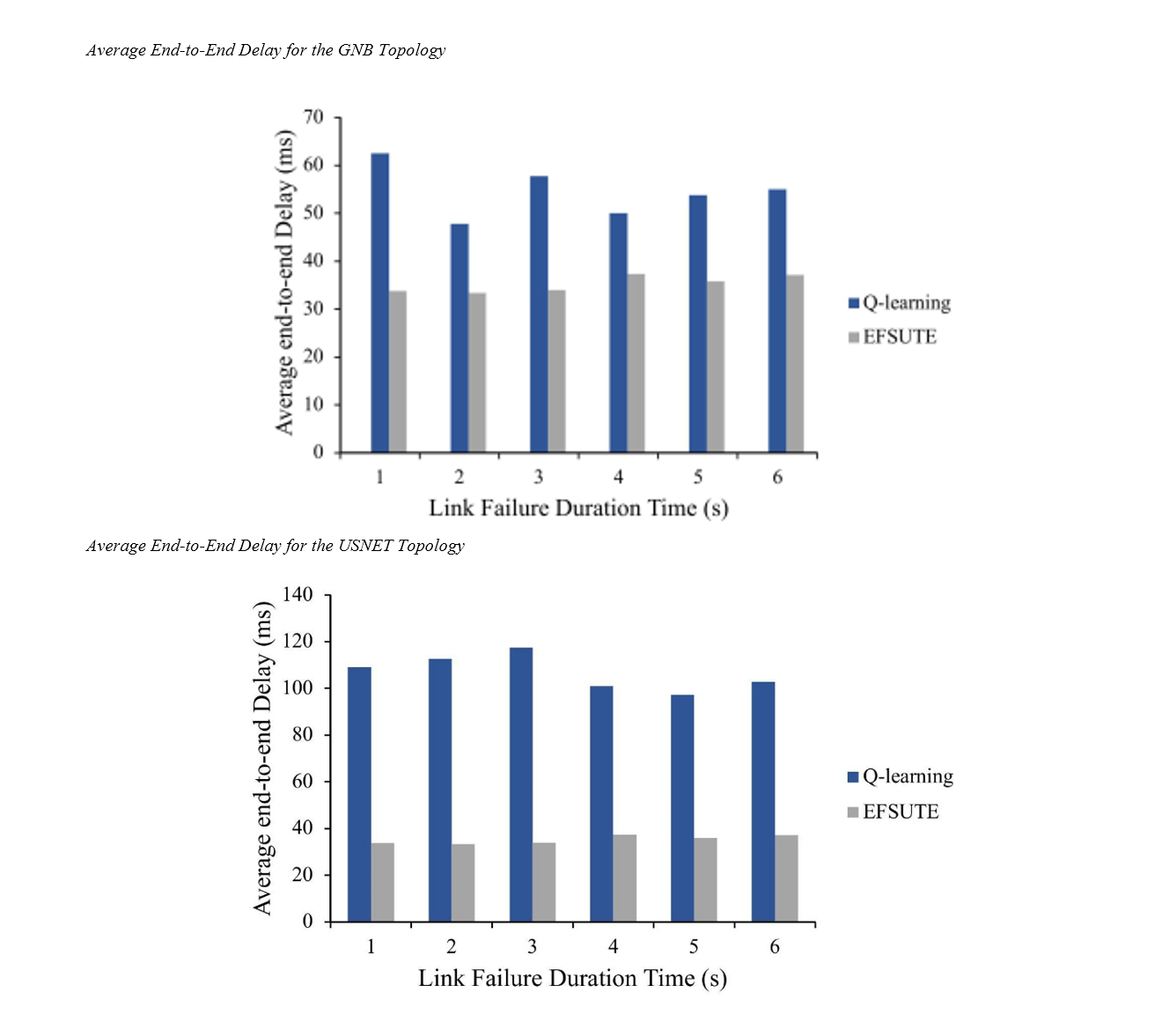A Machine Learning-Based Approach for Link Recovery in Smart Grids Using Software-Defined Networking
Keywords:
Smart Grid, Software-Defined Networking (SDN), Q-learning Algorithm, Failure ManagementAbstract
Network failures can cause serious damage and disrupt communications, which in turn significantly reduces service reliability. Among the various causes of network failure, link failure between network components is one of the most common. For intelligent, autonomous operation without human intervention, a smart grid must have a flexible communication infrastructure capable of rapidly detecting and repairing link failures. A software-defined networking (SDN) approach offers this capability. SDN enables centralized control and decouples the data and control planes, facilitating dynamic management and rapid response to failures. This technology enhances the speed of rerouting and path recovery during link failures by providing centralized and optimized decision-making. Central controllers in SDN architectures can select new paths for data flows in the event of failure, thereby reducing recovery time and packet loss rates. In this study, we design a module for the SDN controller equipped with link failure detection features and implement automatic recovery using the Q-learning algorithm. In smart grid environments, packet loss rates are critical because any data loss can degrade service quality and hinder the reception of essential information required for system control in crisis situations, ultimately reducing the grid's ability to respond to instabilities. The core focus of this research is reducing the packet loss rate, as data loss severely impacts network stability and efficiency. When comparing the proposed method to a reference study, the packet loss rate, recovery time, and algorithm execution time in the German topology decreased by 66.62%, 85.99%, and 91.99%, respectively. Similarly, in the U.S. topology, these metrics were reduced by 90.50%, 76.99%, and 98.99%, respectively. Additionally, compared to the normal state, the packet loss rate was reduced by an average of 67.95% in the German topology and 13.15% in the U.S. topology.
References
Abdulkadhim, M., Abdulmuhsen, N. Q., & Al-Kadhimi, A. M. (2022). Design and Simulation of a Software Defined Networking-Enabled Smart Switch for Internet of Things-Based Smart Grid. Indonesian Journal of Electrical Engineering and Computer Science, 25(2), 780. https://doi.org/10.11591/ijeecs.v25.i2.pp780-787
Ali, J., Lee, G. M., Roh, B. H., Ryu, D. K., & Park, G. (2020). Software-defined networking approaches for link failure recovery: A survey. Sustainability, 12(10), 42-55. https://doi.org/10.3390/su12104255
Bhavani, A., Ramana, A. V., & Chakravarthy, A. S. N. (2023). A Review on Machine Learning Based Routing Protocols for Delay Tolerant Networks. Intelligent Decision Technologies, 17(2), 287-299. https://doi.org/10.3233/idt-220018
Ibitoye, O., Abou-Khamis, R., Shehaby, M. e., Matrawy, A., & Shafiq, M. O. (2019). The Threat of Adversarial Attacks on Machine Learning in Network Security -- A Survey. https://doi.org/10.48550/arxiv.1911.02621
Ibitoye, O., Abou-Khamis, R., Shehaby, M. e., Matrawy, A., & Shafiq, M. O. (2025). The Threat of Adversarial Attacks Against Machine Learning in Network Security: A Survey. J. Electron. Electric. Eng. https://doi.org/10.37256/jeee.4120255738
Krivoshchekov, S., Kochnev, A., & Ozhgibesov, E. (2022). The Application of Neural Networks to Forecast Radial Jet Drilling Effectiveness. Energies, 15(5), 1917. https://doi.org/10.3390/en15051917
Mishra, C., & Gupta, D. (2017). Deep Machine Learning and Neural Networks: An Overview. Iaes International Journal of Artificial Intelligence (Ij-Ai), 6(2), 66. https://doi.org/10.11591/ijai.v6.i2.pp66-73
Mohammad, R. (2024). Principles of designing software-defined networks. Abou Ali Sina University Press.
Mohammadi, R., & Javidan, R. (2021). EFSUTE: A novel efficient and survivable traffic engineering for software defined networks. Journal of Reliable Intelligent Environments, 137, 1-14. https://link.springer.com/article/10.1007/s40860-021-00139-0
Shafiullah, G. M., Maung Than Oo, A., Ali, A. B. M. S., & Wolfs, P. (2013). Smart grid for a sustainable future. Smart Grid and Renewable Energy, 4, 23-34. https://doi.org/10.4236/sgre.2013.41004
Tang, Y. (2024). The Application of Machine Learning in the Field of Network Security. Tcsisr, 7, 363-369. https://doi.org/10.62051/cw085k64
Ueyoshi, K., Marukame, T., Asai, T., Motomura, M., & Schmid, A. (2016). Robustness of Hardware-Oriented Restricted Boltzmann Machines in Deep Belief Networks for Reliable Processing. Nonlinear Theory and Its Applications Ieice, 7(3), 395-406. https://doi.org/10.1587/nolta.7.395
Wei, Y., Ji, C., Galvan, F., Couvillon, S., Orellana, G., & Momoh, J. A. (2014). Learning Geotemporal Nonstationary Failure and Recovery of Power Distribution. IEEE Transactions on Neural Networks and Learning Systems, 25(1), 229-240. https://doi.org/10.1109/tnnls.2013.2271853
Zhang, Y., Wu, J., Chen, Z., Huang, Y., & Zheng, Z. (2019). Sequential node/link recovery strategy of power grids based on q-learning approach. In 2019 IEEE International Symposium on Circuits and Systems (ISCAS),
Zheng, C., Zang, M., Hong, X., Perreault, L. P. L., Bensoussane, R., Vargaftik, S., Ben-Itzhak, Y., & Zilberman, N. (2024). Planter: Rapid Prototyping of in-Network Machine Learning Inference. Acm Sigcomm Computer Communication Review, 54(1), 2-21. https://doi.org/10.1145/3687230.3687232
Zhou, Y., Zhang, F., Sun, G., & Pan, S. (2021). Machine Learning Based LFM Signal Recovery for Fiber-Connected Radar Networks. M4B.2. https://doi.org/10.1364/oecc.2021.m4b.2

Downloads
Published
Submitted
Revised
Accepted
Issue
Section
License
Copyright (c) 2024 Nasser Mozayani, Hemila Vali (Author)

This work is licensed under a Creative Commons Attribution-NonCommercial 4.0 International License.









